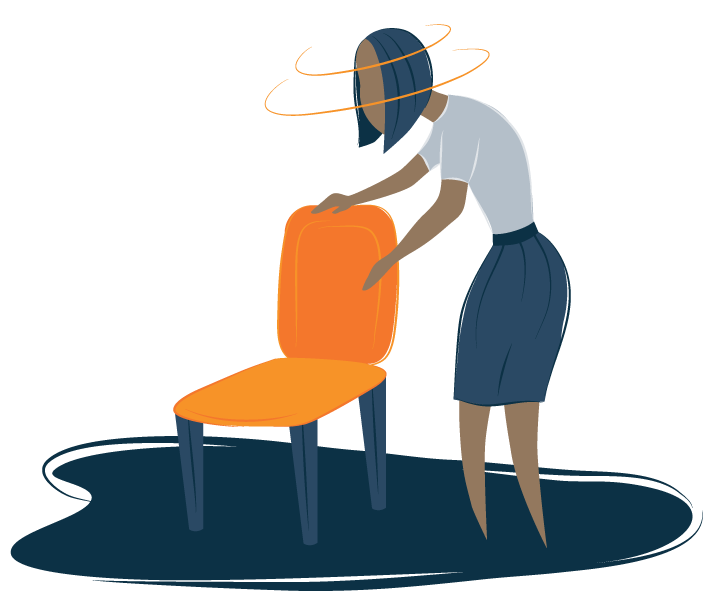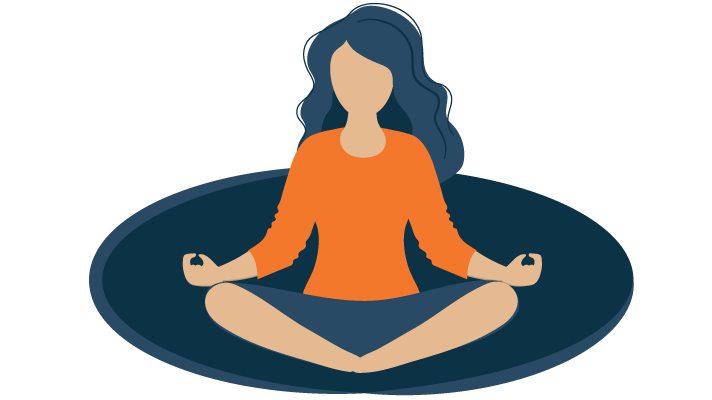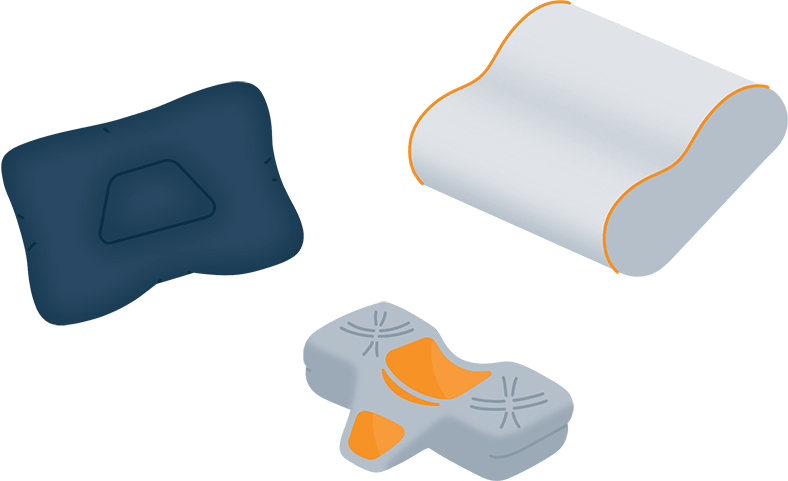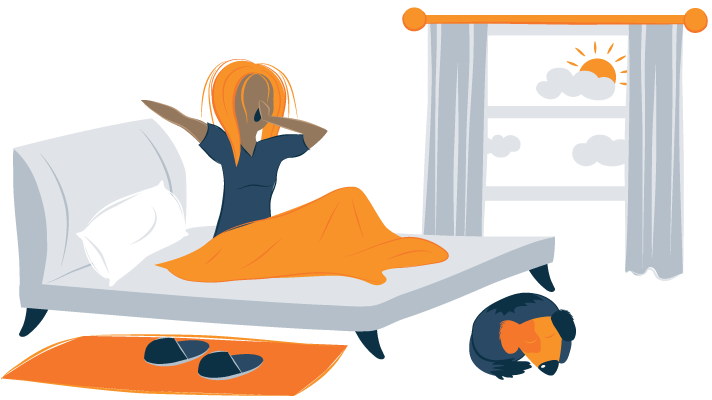If you have ever felt like the room is spinning even when you’re not moving, you’ve experienced one of the symptoms of vertigo. Along with dizziness, vertigo can also come with feeling off balance. People with this condition can experience an unbalanced sensation for moments, hours, and sometimes even days.
Symptoms of vertigo can be exacerbated by lack of sleep, and in this article, we’ll talk about how to get better sleep with vertigo. First, though, it will be important to get a good understanding of what exactly vertigo is, what causes it, and some different treatment options.
What is Vertigo?
Vertigo1 is the feeling of being dizzy, off balance, or in a spinning room, even if you’re moving slightly or not at all. It is different from feeling lightheaded in that you’ll actually feel like you are spinning or moving, or that the world is spinning around you.1 While not life-threatening in and of itself, vertigo can be disorienting and cause other symptoms like nausea and vomiting.1 Also, if it sets in while you’re driving, operating heavy machinery, or participating in an athletic sport, serious injury could occur to you and others.
What Causes Vertigo?
There are two types of vertigo, and the causes of each are different. The first type of vertigo is called peripheral vertigo, which is caused by issues in the inner ear, where balance is controlled.1 The second type of vertigo is called central vertigo, which is caused, not by the inner ear, but by the brain or brainstem itself.1
Below, we’ll get into some of the most common causes of both peripheral and central vertigo.
Benign Paroxysmal Positional Vertigo
One of the most common causes of peripheral vertigo is called benign paroxysmal positional vertigo2 (BPPV). Often BPPV is caused by an injury to the ear area, but sometimes the origin of BPPV is unknown.
We all have small calcium “crystals” inside our ears that make us sensitive to gravity.2 Sometimes (like in the case of a head injury), these crystals can become dislodged and move into one of the ear’s canals when lying down or moving your head in certain positions, causing a spinning sensation.2
BPPV can usually be treated by a healthcare provider3, who will do a physical maneuver to reposition the calcium crystals that have become dislodged.
Meniere’s Disease
Another potential cause of peripheral vertigo is Meniere’s disease4. Unlike calcium buildup, the cause of Meniere’s disease is a buildup of fluid in the ear that leads to pressure changes.4 There is some debate as to what causes this buildup of fluid in some people – some believe it is the result of constricted blood vessels, others believe it is due to viral infections or autoimmune reactions, and others believe it is genetic.4
Aside from vertigo, symptoms of Meniere’s disease can include tinnitus (a ringing in the ears), hearing loss, and a feeling of congestion in the ears.4
This disease typically sets in between the ages of 20 and 50 and often results in some degree of permanent hearing loss.4
Infections/Labyrinthitis
A viral infection5 could be to blame for symptoms of peripheral vertigo. Certain viruses can cause inflammation in the nerves around the inner ear, which will result in the feeling of spinning. The part of the inner ear where the infection occurs is called the labyrinth, hence the term labyrinthitis.5
Oftentimes, labyrinthitis follows a viral infection like a cold or the flu. However, it can also be caused by many other factors, including head trauma, allergies, alcohol abuse, bacterial infections, tumors in the middle ear, or taking high doses of aspirin.5
Certain Drugs
Certain drugs like anti-seizure medications, aspirin, and alcohol can cause central vertigo.1 These drugs have an impact on the brain and brainstem6, and when taken in a toxic amount, can cause the brain to perceive feelings of spinning.
Multiple Sclerosis
Multiple sclerosis (MS) is one of the more common reasons for central vertigo in younger patients.6 Areas in the brain that coordinate balance (aside from the inner ear) can become damaged due to MS, thereby creating a sense of dizziness and lack of balance.
Tumors
A brain tumor located in the cerebellum, which is the part of the brain that controls movement, may cause central vertigo.6 These tumors can be either benign or malignant.
Other causes of central vertigo include strokes, vestibular migraines, blood vessel disease, and, rarely, seizures.1 Even though central vertigo is far less common than peripheral vertigo, the underlying issue may be serious and should be addressed by a doctor.
Vertigo Symptoms
Whether it is peripheral or central vertigo, the most common symptoms include1:
- Extreme, prolonged dizziness
- A feeling like you’re spinning or tilting
- Difficulty maintaining your balance
Other symptoms that can occur with either type of vertigo include1:
- Nausea
- Vomiting
- Headaches
- Tinnitus
- Hearing loss in one or both ears
If you’re experiencing central vertigo, you may also have the following symptoms1:
- Difficulty swallowing
- Blurred vision
- Eye movement problems
- Facial paralysis
- Slurred speech
- Weakness in the limbs
Vertigo Treatments
In many cases, vertigo can disappear without treatment because the body is naturally self-healing and aims to be in a state of homeostasis, or equilibrium. Therefore, if your vertigo is caused by an infection and the infection goes away, your vertigo should also go away.
Your body is also highly adaptive, and it may adapt to the condition you have in your inner ear and rely on the rest of your senses for balance. Again, this is a case of vertigo going away on its own.
However, if vertigo persists or interferes with your daily activities, you’ll want to get in touch with a medical professional, who might prescribe you medication or perform a procedure to treat your symptoms. If your vertigo is coupled with double vision, slurred speech, or loss of coordination, you should call 911.1
Vestibular Rehabilitation
Vestibular rehabilitation7 is a more formal process for training your other senses to adapt and relieve your vertigo symptoms. You’d work with someone trained in physical therapy to perform a series of exercises that help improve your balance and reduce dizziness.
Canalith Repositioning Maneuvers
These are a series of head movements that reposition the debris in your inner ear from BPPV.
The two most well-known movements are the Epley Maneuver8 and the Half Somersault Maneuver9. Both of these maneuvers trigger sensations similar to vertigo but are typically successful at rebalancing the inner ear.
We recommend doing these movements under the guidance of a medical professional for the best success rate.
Medication
Some, though not all, forms of vertigo can respond to medication. For example, if a bacterial infection is causing peripheral vertigo, you may be able to take antibiotics to get rid of the symptoms.
A doctor may also prescribe a diuretic10 for patients with Meniere’s disease to ease fluid buildup in the ear.
Surgery
Sometimes for severe vertigo, a specialist will perform what is called a Vestibular Neurectomy11. This involves cutting the balance nerve behind the ear. However, this surgery comes with risks and is not very common.
In rare cases, vertigo is the result of a tumor, either in the cerebellum portion of the brain or near the inner ear. The only way to find relief may be to perform surgery to remove the tumor.
Sleeping Tips for Vertigo
Research12 shows that not getting enough sleep can make symptoms of vertigo more frequent and pronounced. Additionally, episodes of vertigo can cause disruptions in sleep13, resulting in something of a cycle.
The best thing to do is to try treating both your vertigo symptoms and any sleep dysfunction at the same time, so hopefully, both will improve. Below are some ways you can improve your sleep, which, hopefully, will improve your vertigo symptoms as well.
Before Bed
– Avoid eating spicy food: Hot and spicy food can disrupt your digestive processes14 and make it harder to sleep through the night. In the several hours before you go to bed, stick to milder options.
– Avoid looking at bright screens: The light from your television or phone delays the production of melatonin, a crucial hormone to help you fall and stay asleep. Instead of looking at electronics, try reading a book instead.
– Avoid caffeine: In addition to keeping you awake, the acid in caffeine15 could wake you up at night with heartburn. Caffeine’s diuretic nature could also make you feel like you have to go to the bathroom in the middle of the night.15 If you’re making a concerted effort to sleep through the night, abstain from caffeine eight hours16 before bedtime.
– Breathing exercises and meditation: Breathwork and meditation may help you fall asleep faster and sleep more deeply through the night by helping you relax. One of the most popular breathing exercises for sleep is called the 4-7-8 Breathing Exercise17, designed to move your body and mind into a more relaxed state. Here’s how it works17:
- Inhale through your nose for a count of four
- Hold your breath for a count of seven
- Exhale completely with a whooshing sound for a count of eight
This deep breathing technique oxygenates your blood and produces a relaxing effect that can encourage sleep.
Meditation is also helpful for clearing your mind. There are many different types of meditation, but one of the most basic is to sit with your eyes closed and focus inward on your bodily sensations. If you have thoughts come up (which you likely will), try to let them pass by. You can start with five minutes of meditation in the morning and at night, and then increase from there if you’d like.
Want to learn more? Read our complete guide to bedtime rituals.
Sleeping Position
You’ll probably find that lying on one side, in particular, can make your vertigo worse. That’s most likely going to be the side with your “bad” ear. The best thing to do in that scenario is to sleep on the other side and make it difficult to roll over in the night, with a barrier of pillows, for example.
You can also experiment with back and stomach sleeping to see if that makes the situation either better or worse. There’s no one-size-fits-all solution, so the best way to find the sleeping position that’s right for you is through trial and error.
Head Positioning
The important thing to keep in mind with head positioning is to strategically place your head at an angle that prevents pressure from fluid buildup or the settling of inner ear debris. This buildup can commonly happen when people with vertigo tip their head too far back, or change positions suddenly.2
If you sleep on only one pillow, try adding a second pillow to prop your head up further. You may also want to get a wedge pillow to keep your head at an incline naturally. Again, finding the right setup may take some trial and error to find out what position is the least triggering for your vertigo.
Use Higher Pillows
The higher your pillow, the better an angle18 you’ll be able to achieve. The wedge pillow mentioned above is helpful. Airplane travel pillows, which offer extra support to keep the head at an even higher angle, may also help.
Body pillows are also useful if you’re trying to prevent yourself from rolling over to your bad side.
Change Your Diet
If you love salt, you may want to consider cutting back until your vertigo symptoms improve because high amounts of sodium can increase water retention19. This water retention may affect the fluid balance in the ear and make vertigo worse.
In general, the healthier you eat, the better your body will be at adapting and healing itself, so if you eat a lot of junk food and processed food, try switching to a more natural and plant-based diet. This should improve both your vertigo symptoms and your sleep.
Take Medication or Supplements Before Bed
As we mentioned, some medications can help improve symptoms of vertigo. If your vertigo is causing you nausea before bed, for example, you might take an anti-nausea medication like Dramamine in order to get some better sleep. In addition, supplements20 such as magnesium and L-lysine are thought to improve both vertigo symptoms and sleep quality. Recent studies21 also point to vitamin D and calcium as promising effective treatments for vertigo, and they could help improve sleep22.
Even though supplements are over-the-counter, we recommend always speaking to your doctor first to make sure it’s a good fit for you.
Tips After Waking Up
One of the most common triggers for BPPV is getting up out of bed due to sudden movements or changes in the head’s position that can cause the dislodged crystals in your inner ear to shift, leading you to feel dizzy or like you’re spinning.2
To avoid this course of events, wake up slowly and move your head as little as possible. Be deliberate while moving gently from lying down, to sitting, to standing. Also, if you have a loud alarm clock, consider switching to an alarm that wakes you up with natural light or music. This way, you will wake up more gently and may minimize the risk of jerking your head.
Frequently Asked Questions
How do I know if it is just dizziness or if it’s vertigo?
The sensation of dizziness23 can be caused by anemia, blood loss, heart problems, diabetes, panic attacks, anxiety, alcohol consumption, and high doses of caffeine, among other factors. To know if your feelings of dizziness are signs of vertigo, track the length and frequency of your dizzy spells. If they’re infrequent and shorter than a minute or two, it’s likely just dizziness. If the spells happen frequently or last for more than two minutes, it could be vertigo.
Additionally, dizzy spells24 don’t typically have the characteristic “room-is-spinning” quality of vertigo. If you genuinely feel like you or your surroundings are moving and can’t get your balance, it may be vertigo. As always, we suggest consulting your doctor if you’re concerned.
How long does vertigo last?
Individual episodes of vertigo can last several minutes, hours, or even days. If the condition is left untreated, it may persist, on and off, for months25. The total duration depends heavily on what’s causing your vertigo. If it is happening because of BPPV, as most cases are, you should be able to get rid of symptoms within a week or less by performing a series of specialized movements3. You can do these at home26 or with the guidance of a medical professional or physical therapist.
If, however, your vertigo is due to inflammation, a tumor, an illness, or some other underlying issue, you’ll have to address the root cause before you can expect relief.
When should I see a doctor?
If your episodes are happening suddenly, frequently, or over extended periods of time, you should make an appointment with your doctor. If the dizziness is coupled with other symptoms like difficulty speaking or moving, or blurred vision, you may be experiencing something more serious, potentially a stroke.1 If this is the case, we urge you to head straight to the emergency room.
What’s the connection between sleep apnea and vertigo?
Some studies27 have found a connection between obstructive sleep apnea and vertigo. This connection28 may be due to lower oxygen levels in the brain during sleep or breathing issues causing the pressure to change in the inner ear.
The exact reason behind the connection between sleep apnea and vertigo is still being explored, but it does seem there is a connection between the two. Whether or not this relationship is causal is still being investigated.
Conclusion
While vertigo can be scary and uncomfortable, it doesn’t have to be a permanent condition. By addressing the underlying cause or taking action to reduce your symptoms, you may be able to go back to living a normal life without drastic medical intervention.
Remember, maintaining a healthy and active lifestyle, as well as getting proper sleep, can be helpful in reducing symptoms or preventing them altogether.
References:
- “Vertigo”. Penn Medicine. Last modified November 9, 2021.
- “Benign paroxysmal positional vertigo (BPPV)”. Mayo Clinic. Last modified August 5, 2022.
- “Benign Paroxysmal Positional Vertigo (BPPV)”. Mount Sinai. Webpage accessed August 4, 2024.
- “Ménière’s Disease”. National Institute on Deafness and Other Communication Disorders. Last modified February 13, 2017.
- Rizk, Habib G., Shah, Sunny. “Labyrinthitis and Vestibular Neuritis”. The Vestibular Disorders Association. Webpage accessed August 4, 2024.
- Lui, Forshing., et al. “Central Vertigo”. National Library of Medicine. Last modified December 22, 2022.
- Farrell, Lisa. “Vestibular Rehabilitation Therapy (VRT)”. The Vestibular Disorders Association. Webpage accessed August 4, 2024.
- “Canalith Repositioning Procedure”. Cleveland Clinic. Last modified August 29, 2022.
- Sanchez, Hayley. “Struggling With Vertigo? Try This Colorado Doctor’s ‘Half Somersault Maneuver’”. Colorado Public Radio. 2019.
- “Meniere’s Disease”. Mount Sinai. Webpage accessed August 4, 2024.
- “Is Vertigo Surgery Worth It? The Unexpected Risks Involved”. Align Wellness Center. Webpage accessed August 4, 2024.
- Kim, Sung Kyun., et al. “Relationship between sleep quality and dizziness”. National Library of Medicine. 2018.
- Iranfar, Khosrow., Azad, Samaeh. “Relationship between benign paroxysmal positional vertigo (BPPV) and sleep quality”. ScienceDirect. 2022.
- “Better Sleep: 3 Simple Diet Tweaks”. Johns Hopkins Medicine. Webpage accessed August 4, 2024.
- Evans, Justin., Richards, John R., Battisti, Amanda S. “Caffeine”. National Library of Medicine. Last modified November 28. 2022.
- “When to stop drinking alcohol, water or caffeine before bed for better sleep”. Michigan Medicine. 2020.
- “How To Do the 4-7-8 Breathing Exercise”. Cleveland Clinic. 2022.
- Horinaka, Akira., et al. “Head-Up Sleep May Cure Patients With Intractable Benign Paroxysmal Positional Vertigo: A six-Month Randomized Trial”. National Library of Medicine. 2019.
- “Good and Bad Food for Vertigo, A Diet to Help You with Your Vertigo”. Align Wellness Center. Webpage accessed August 4, 2024.
- Wolf, Alicia. “Natural Supplements for Vestibular Disorders”. The Vestibular Disorders Association. Webpage accessed August 4, 2024.
- Slomski, Anita. “Vitamin D and Calcium Prevent Recurrent Vertigo”. JAMA Network. 2020.
- Romano, Fiammetta., Muscogiuri, Giovanna., et al. “Vitamin D and Sleep Regulation: Is there a Role for Vitamin D?” National Library of Medicine. 2020.
- “Dizziness – orthostatic hypotension”. Victoria State Government Department of Health. Webpage accessed August 4, 2024.
- “Dizziness, vertigo and balance disorders”. Victoria State Government Department of Health. Webpage accessed August 4, 2024.
- “Vertigo”. National Health Service. Last modified May 2, 2024.
- “Home Epley Maneuver”. Johns Hopkins Medicine. Webpage accessed August 4, 2024.
- Chen, Po-Yueh., et al. “REM-related obstructive sleep apnea and vertigo: A retrospective case-control study”. National Library of Medicine. 2021.
- “Can Sleep Apnea Cause Vertigo & What to Do About it”. Align Wellness Center. Webpage accessed August 4, 2024.

Jill Zwarensteyn
Editor
About Author
Jill Zwarensteyn is the Editor for Sleep Advisor and a Certified Sleep Science Coach. She is enthusiastic about providing helpful and engaging information on all things sleep and wellness.
Combination Sleeper




